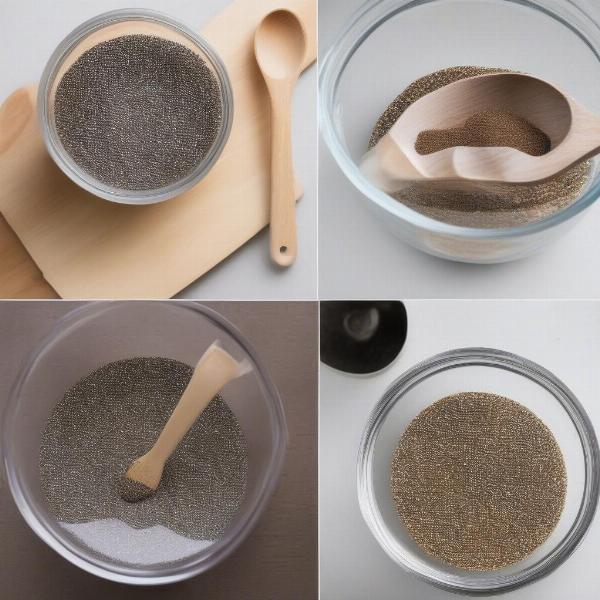Chia seeds are a nutritional powerhouse, packed with fiber, omega-3 fatty acids, antioxidants, and various vitamins and minerals. Adding these tiny seeds to your dog’s diet can offer several health benefits, from improved digestion to healthier skin and coat. But how do you prepare chia seeds for your canine companion to ensure they reap the full rewards? This article will guide you through the best ways to incorporate chia seeds into your dog’s meals.
Soaking Chia Seeds for Dogs: The Best Method
The most common and recommended way to prepare chia seeds for dogs is by soaking them in water. This process creates a gel-like consistency that is easier for dogs to digest and absorb nutrients. Simply mix one part chia seeds with nine parts water and let it sit for about 15-20 minutes. The mixture will thicken into a gel. This gel can be added to your dog’s food, whether it’s kibble, wet food, or a homemade meal.
 Soaking Chia Seeds for Dogs
Soaking Chia Seeds for Dogs
Grinding Chia Seeds for Dogs: An Alternative Approach
Another method is to grind chia seeds into a powder before adding them to your dog’s food. Grinding breaks down the outer layer of the seed, potentially making it even easier for your dog to digest. Use a coffee grinder or a dedicated spice grinder to create a fine powder. Be sure to clean the grinder thoroughly before and after use to avoid cross-contamination with other foods. However, remember that grinding reduces the omega-3 content due to oxidation, so soaking is generally preferred.
How Much Chia Seeds Should I Give My Dog?
While chia seeds are beneficial, moderation is key. Too many chia seeds can lead to digestive upset, especially if your dog isn’t used to them. Start with a small amount, about 1/4 teaspoon for small dogs and 1/2 to 1 teaspoon for larger breeds, per day. Gradually increase the amount over time, monitoring your dog for any adverse reactions.
Can Puppies Eat Chia Seeds?
Yes, puppies can benefit from chia seeds too! They’re a great source of nutrients for growing pups. However, start with an even smaller amount than you would give an adult dog, and always consult your veterinarian before adding new foods to your puppy’s diet, especially if they have any existing health conditions.
Chia Seed Benefits for Dogs: A Closer Look
The benefits of chia seeds for dogs are numerous. The high fiber content can aid digestion and regulate bowel movements. Omega-3 fatty acids promote healthy skin and a shiny coat, while antioxidants help protect against cell damage. Chia seeds are also a good source of protein, calcium, and phosphorus, all essential for overall health.
Are There Any Risks of Feeding Chia Seeds to Dogs?
While generally safe, there are a few potential risks to consider. As mentioned, too many chia seeds can cause digestive upset. Also, dogs with bleeding disorders or those taking blood-thinning medications should avoid chia seeds due to their blood-thinning properties. Always consult with your veterinarian before adding chia seeds to your dog’s diet, especially if your dog has pre-existing health conditions.
Conclusion
Chia seeds can be a valuable addition to your dog’s diet when prepared and served correctly. Soaking is the recommended method, offering optimal digestibility and nutrient absorption. Remember to introduce chia seeds gradually and monitor your dog for any adverse reactions. By following these guidelines, you can help your furry friend enjoy the numerous health benefits these tiny seeds offer.
FAQ
- Can I feed my dog dry chia seeds? While not harmful, dry chia seeds are harder to digest and may pass through your dog’s system without being fully absorbed. Soaking is recommended for optimal nutrient absorption.
- How often can I give my dog chia seeds? Chia seeds can be given daily as part of a balanced diet.
- Are chia seeds a good source of protein for dogs? While they contain protein, chia seeds shouldn’t be relied upon as a primary protein source. They are best used as a supplement.
- Can chia seeds help with my dog’s allergies? Omega-3 fatty acids in chia seeds can contribute to healthier skin and coat, potentially alleviating some allergy symptoms. However, consult your veterinarian for specific allergy concerns.
- What if my dog doesn’t like the taste of chia seeds? Try mixing a small amount into their favorite wet food or blending the chia gel into a smoothie-like consistency.
- Can I give my dog chia seeds with other supplements? Consult your vet before combining chia seeds with other supplements to avoid potential interactions.
- Are white chia seeds better than black chia seeds for dogs? There is no significant nutritional difference between white and black chia seeds.
Introducing ILM Dog
ILM Dog (https://ilmdog.com) is your trusted resource for expert advice on dog care, nutrition, and well-being. We offer valuable insights on breed selection, health and medical care, training, grooming, and much more. Whether you’re a new dog owner or a seasoned expert, ILM Dog provides practical and reliable information to help you provide the best possible care for your canine companion. For any inquiries, reach out to our dedicated team at [email protected] or call us at +44 20-3965-8624.